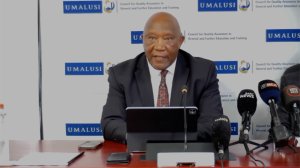Education standards quality assurance council Umalusi is pleased that while there were no detected cases of paper leakages, or other irregularities that could have compromised the overall credibility and integrity of the 2024 national examinations, it did note a high absenteeism rate in some examinations.
As matric learners anticipate their results on Tuesday, Umalusi approved the release of the results and, in a media briefing, revealed that out of the 880 209 candidates who were registered to write the National Senior Certificate (NSC) examination under the Department of Basic Education (DBE), 810 900 wrote their exams.
“…that implies that 69 309, or 7.9%, of the registered students were absent from the examinations. The 810 900 candidates who sat for the examinations include 704 401 full-time candidates and 106 499 part-time candidates,” said Umalusi council chairperson Professor Yunus Ballim.
The examination was written across 6 933 centres across the nine provinces.
The DBE presented results of 68 subjects for standardisation, and, after careful analysis of the numerical evidence and narrative reports presented, the Amended Senior Certificate (ASC) arrived at the decisions that raw marks were accepted for fifty-three subjects (77.9%).
“A year-on-year comparison shows a clear pattern of an upward trend in the number of subjects for which raw marks were accepted over the last four years. This is a clear signal that the system continues to produce consistent and reliable results over time,” explained Ballim.
Umalusi CEO Dr Mafu Rakometsi said the council was concerned with “the persistent phenomenon” of some teachers and principals refusing to allow registered learners to write examinations in particular subjects.
“Anecdotally, this practice is motivated by the desire to improve results. This is unlawful and Umalusi advises the affected learners and parents or guardians to report such incidents to the relevant authorities,” Rakometsi stated.
Umalusi had received a report from the DBE stating that an independent school allowed 30 candidates who did not pass Grade 11 to register for the Grade 12 examinations.
It also received reports from the Department of Higher Education and Training (DHET), which revealed that 128 private colleges administered the N2-N3 examinations despite those colleges not being accredited by Umalusi.
For that reason, Umalusi had directed the DHET to investigate the matter and furnish Umalusi with a full report, said Rakometsi, who pointed out that almost 365 N2-N3 candidates in the private college sector were reported to have been involved in acts of copying.
He highlighted that while there had been a reduction in the number of reported cases of group copying in the DBE, Umalusi was concerned that KwaZulu-Natal and Mpumalanga were once again at the top of the list with 195 and 74 implicated candidates respectively.
This is a decrease from 945 in 2023 to 407 in 2024.
Meanwhile, a total of 1 060 852 candidates sat for the 2024 end of year examinations. Of these candidates, 227 859, or 21.5%, wrote the NC(V) L2-L4 examinations, N2-N3 examinations or the GETC: ABET examinations.
MARKING CONCESSIONS
Rakometsi pointed to year-on-year increase in the number of marking concessions that the DHET applied for. He said for the 2024 examinations Umalusi received marking concessions in 19 subjects compared to 17 in 2023.
A marking concession is when an assessment body makes a request to Umalusi to have certain questions that are found to be 'problematic' during the marking process to be excluded either entirely or partly and upscaling the total marks achieved using conversion tables.
“What is problematic about this practice is that it has the likelihood of negatively affecting the overall standard of the question papers concerned,” Rakometsi explained.
Umalusi urged all role players to put in place stringent measures to prevent the recurrence of all the issues, highlighting that if left unattended, the lapses in question could undermine the “validity” of the exam and the integrity of the certificates issued by Umalusi.
SUBJECT HIGH FAILURE RATES
Meanwhile, Umalusi said there were subjects that continued to produce unusually high failure rates, noting that these observations raised the question about the levels of support that candidates find in their teaching, learning and examination preparation experiences.
He confirmed that during Umalusi’s standardisation processes, the ASC conducted meticulous analysis of the evidence presented in relation to each of the 514 subjects spread across four qualifications – 150 NSC, 269 NCV L2-L4, 55 N2 - N3 and 40 GETC: ABET to arrive at standardisation decisions.
“Crucially important, I want to assure you that there were no deviations from the standardisation principles in the way the ASC standardised the 514 subject results. This makes it abundantly clear that the ASC carries a great responsibility on its shoulders, i.e. to ensure that Umalusi truly honours its vision of being a trusted authority in fostering high education standards in General and Further Education and Training,” he explained.
EMAIL THIS ARTICLE SAVE THIS ARTICLE ARTICLE ENQUIRY
To subscribe email subscriptions@creamermedia.co.za or click here
To advertise email advertising@creamermedia.co.za or click here










